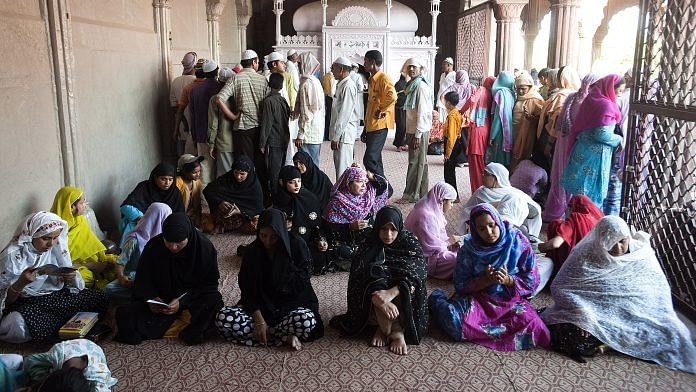New Delhi: The All India Muslim Personal Law Board (AIMPLB) has said it supports the entry of women inside mosques, telling the Supreme Court Wednesday that Islam neither restricts women from entering mosques, nor praying there.
However, it has added that Islam doesn’t require women to pray in Friday congregations, and that the AIMPLB could not enforce any rules on mosques.
The AIMPLB, a non-government organisation working in the realm of Muslims’ legal and constitutional rights, made the contention in reply to a PIL demanding equal access for women in mosques and equal rights to pray, as guaranteed by the Constitution.
The petition has been filed by a Pune-based couple, Yasmeen Zuber Peerzade and her husband Zuber Ahmad Peerzade.
According to the petitioners, some mosques of certain Islamic denominations allow women to enter and pray in separate enclosures. They are, however, barred from entering all mosques of the Sunni sect, they claim.
Sunnis constitute the majority of India’s Muslims.
The plea said there was no gender segregation in Islam and claimed separate enclosures for women in certain mosques were a form of discrimination that violated their fundamental right to dignity.
The top court asked the couple if they had been barred from entering mosques, and their lawyer said they had.
In April 2019, a bench led by Justice S.A. Bobde (now Chief Justice of India) cited the majority verdict in the Sabarimala case — that devotion can’t entail gender bias — and asked the central government, the AIMPLB and the Central Wakf Board to submit their views on the petition.
Also read: SC 9-judge bench on Sabarimala to now hear larger issues of faith vs fundamental rights
‘Can enter mosques for prayers’
In its reply, accessed by ThePrint, the AIMPLB has stated that a woman is completely free to enter a mosque and pray. If there are any fatwas against it, they should be “ignored”, the body has added.
“Considering… religious texts, doctrine and religious belief of the followers of Islam, it is submitted that entry of women in the mosque for offering prayer/namaz, inside the mosque, is permitted,” it has stated. “Thus, a Muslim woman is free to enter masjid for prayers. It is her option to exercise her right to avail such facilities as available for prayers in masjid.
However, the board has also cited religious doctrine or ‘Hadith’ to argue that women are not required to pray in congregation.
‘Can’t impose decisions on mosques’
The stand of the board is reminiscent of the argument it put forth during the Supreme Court case on the constitutional validity of triple talaq or instant divorce, whereby Muslim men were known to divorce their wives by calls and even text.
The board had argued at the time that the practice was a “sin” but urged courts to remain out of it. When the practice was banned by the Supreme Court, the AIMPLB had opposed the order.
In its reply in the instant case, the board has said Friday prayers, which are performed at mosques by men, are not mandatory for women.
“Islam has not made it obligatory on Muslim women to join congregational prayer nor is it obligatory for woman to offer Friday namaz in congregation though it is so on Muslim men,” it has claimed.
“The Muslim woman is differently placed because as per doctrines of Islam she is entitled to the same religious reward (sawab) for praying as per her option either in masjid or at home,” the board added.
The AIMPLB has also said it is only a “body of experts” and cannot impose its decisions on mosques, which it described as a private religious organisation.
“The practices of religion on the places of worship (which in the present matter are masjids) are purely private bodies regulated by muttawalis of the mosques,” the board added.
“We being body of experts, without any state powers, can only issue advisory opinion, based on Islam. Neither we nor the Hon’ble Court for that matter, cannot enter into the arena of detailed arrangements of a religious place, which is a completely privately managed entity for religious practices of believers in particular religion,” says the board.
Also read: How Supreme Court bench on Sabarimala review differs on faith and law



